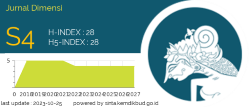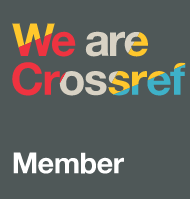ANALISIS WEBSITE SISTEM INFORMASI PEMERINTAH DI PROVINSI INDONESIA DENGAN SISTEM MERIT
Abstract
Keywords
Full Text:
PDFReferences
Aisyah, N. (2021). Usia Produktif Diukur dari Rentang Usia Berapa? Ini Penjelasannya. Https://Www.Detik.Com/.
Almira, P. D., Lipu, B. G., Pradipta, A. W., & Rachmawati, R. (2021). Utilization of Human Resources Management Information System (SIMPEG) Application to Support E-Government in the BKPP at Palangka Raya Municipality. In Advances in 21st Century Human Settlements (pp. 355–366). Springer. https://doi.org/10.1007/978-981-15-5608-1_28
Amanbek, Y., Balgayev, I., Batyrkhanov, K., & Tan, M. (2020). Adoption of e-Government in the Republic of Kazakhstan. Journal of Open Innovation: Technology, Market, and Complexity, 6(3). https://doi.org/10.3390/joitmc6030046
Andi Irmawati Yusuf, Jeni Kamase, Serlin Serang, & Aryati Arfah. (2021). Pengaruh Pengembangan SDM,Kompetensi dan Motivasi Dalam meningkatkan Organizational Citizenship Behavior (OCB) dan Kinerja Aparatur Sipil Negara pada Pemerintah Daerah Kabupaten Sinjai Provinsi Sulawesi Selatan. Journal of Management Science (JMS), 2(1), 121–144. https://doi.org/10.52103/jms.v2i1.372
Andrianto, E., & Rahmawati, D. (2017). PENGARUH KAPASITAS SUMBER DAYA MANUSIA, PEMANFAATAN TEKNOLOGI INFORMASI, DAN SISTEM PENGENDALIAN INTERN PEMERINTAH TERHADAP KUALITAS LAPORAN KEUANGAN PEMERINTAH DAERAH DENGAN KOMITMEN ORGANISASI SEBAGAI VARIABEL MODERASI (Studi Empiris Pada Satuan Kerja P. Jurnal Fakultas Ekonomi, 1–19.
Androniceanu, A., Kinnunen, J., & Georgescu, I. (2020). E-government clusters in the eu based on the gaussian mixture models. Administratie Si Management Public, 2020(35), 6–20. https://doi.org/10.24818/amp/2020.35-01
Atmojo, M. E., & Pratiwi, V. P. (2020). The implementation of a Merit System in the Selection of Village Officers in the Indonesian Region of Yogyakarta. JPPUMA Jurnal Ilmu Pemerintahan Dan Sosial Politik Universitas Medan Area, 8(2), 134–141. https://doi.org/10.31289/jppuma.v8i2.3695
Bahri, A. S., & Fadhilah. (2020). Do the ethical values of state civil apparatus help to achieve good governance in the administration of public services? Journal of Advanced Research in Dynamical and Control Systems, 12(2), 2563–2573. https://doi.org/10.5373/JARDCS/V12I2/S20201304
Bearfield, D. A., & Bowman, A. O. M. (2017). Can You Find It on the Web? An Assessment of Municipal E-Government Transparency. American Review of Public Administration, 47(2), 172–188. https://doi.org/10.1177/0275074015627694
Fadli, M. R. (2021). Memahami desain metode penelitian kualitatif. Humanika, 21(1), 33–54. https://doi.org/10.21831/hum.v21i1.38075
Grace V. Dumalang. (2021). Adaptif, Agile dan Inovatif Kunci SDM Unggul. Jurnal Administrasi Publik, 17(2), 175–196. https://doi.org/10.52316/jap.v17i2.84
Hidayat, Djuwita, T. M., & Saepudin, B. S. (2019). Morning assembly in forming state civil apparatus’ character to realize bureaucratic reform. International Journal of Innovation, Creativity and Change, 7(3), 20–35. https://www.scopus.com/inward/record.uri?eid=2-s2.0-85076971833&partnerID=40&md5=62f95d2b4db356dcd49f74db1fbdcf4a
Indiahono, D. (2019). Dinamika Relasi Pejabat Politik dan Birokrasi Tingkat Lokal pada Era Orde Baru dan Era Reformasi (Studi Kasus di Kota Tegal). 7(2015), 723–741.
Irfan, M., Syahriadi, M., & Fuad, I. A. (2021). POSITION PAPER TANTANGAN DAN STRATEGI PENERAPAN SISTEM MERIT DI LINGKUNGAN INSTANSI PEMERINTAH.
Jameel, A., Asif, M., & Hussain, A. (2019). Good governance and public trust: Assessing the mediating effect of E-government in Pakistan. Lex Localis, 17(2), 299–320. https://doi.org/10.4335/17.2.299-320(2019)
Khatib, H., Lee, H., Suh, C., & Weerakkody, V. (2019). e-Government systems success and user acceptance in developing countries: The role of perceived support quality. Asia Pacific Journal of Information Systems, 29(1), 1–34. https://doi.org/10.14329/apjis.2019.29.1.1
Laksmi, N. P. Y., & Markeling, I. K. (2014). Penyelenggaraan Manajemen Asn Berdasarkan Sistem Merit Menurut Pasal 51 Undang-Undang Nomor 5 Tahun 2014 Tentang Aparatur Sipil Negara. 1–12.
Lanin, D., & Hermanto, N. (2018). The effect of service quality toward public satisfaction and public trust on local government in Indonesia. International Journal of Social Economics, 46. https://doi.org/10.1108/IJSE-04-2017-0151
Lee, K., Choi, S. O., Kim, J., & Jung, M. (2018). A study on the factors affecting decrease in the government corruption and mediating effects of the development of ICT and E-government-a cross-country analysis. Journal of Open Innovation: Technology, Market, and Complexity, 4(3). https://doi.org/10.3390/joitmc4030041
López-López, V., Iglesias-Antelo, S., Vázquez-Sanmartín, A., Connolly, R., & Bannister, F. (2018). e-Government, Transparency & Reputation: An Empirical Study of Spanish Local Government. Information Systems Management, 35(4), 276–293. https://doi.org/10.1080/10580530.2018.1503792
Malik, S. (2020). The discipline of state civil apparatuses in scope of regional work units in south buru regency. International Journal of Scientific and Technology Research, 9(1), 763–767. https://www.scopus.com/inward/record.uri?eid=2-s2.0-85078732726&partnerID=40&md5=677efdf67a6580bdf6a3b3b148410362
Maulana, M. I. (2021). Seleksi Merit Sistem PNS Pratama Aparatur Sipil Negara di Pemerintah Provinsi. Jurnal Sosial Teknologi, 1(9), 3–20.
Mensah, I. K. (2019). Factors Influencing the Intention of University Students to Adopt and Use E-Government Services: An Empirical Evidence in China. SAGE Open, 9(2), 2158244019855823. https://doi.org/10.1177/2158244019855823
Michael Armstrong, S. T. (2014). HANDBOOK OF HUMAN RESOURCE MANAGEMENT (13th ed.). Ashford Colour press Ltd.
Muis, M. R., Jufrizen, J., & Fahmi, M. (2018). Pengaruh Budaya Organisasi Dan Komitmen Organisasi Terhadap Kinerja Karyawan. Jesya (Jurnal Ekonomi & Ekonomi Syariah), 1(1), 9–25. https://doi.org/10.36778/jesya.v1i1.7
Nasri, W. (2019). E-government adoption in Tunisia extending technology acceptance model. International Journal of Public Administration in the Digital Age, 6(4), 30–42. https://doi.org/10.4018/IJPADA.2019100103
Noors, A. I. A. (2019). Pengarusutamaan Manajemen Talenta Dalam Tata Kelola Msdm Birokrasi Indonesia. Jurnal Ilmu Pemerintahan Suara Khatulistiwa, 4(2), 38–49. https://doi.org/10.33701/jipsk.v4i2.721
Nor, R., Gani, A. J. A., Saleh, C., & Amin, F. (2022). Organizational commitment and professionalism to determine public satisfaction through good governance, public service quality, and public empowerment. International Review on Public and Nonprofit Marketing, 19(1), 191–217. https://doi.org/10.1007/s12208-021-00297-0
Pratama, S. (2019). Analisa pengaruh sumberdaya manusia, prasarana dan lingkungan kerja terhadap kinerja studi pada pegawai universitas pembangunan panca budi medan. Jurnal Manajemen Tools, 11(1), 235–249.
Predy, M., Sutarto, J., Prihatin, T., & Yulianto, A. (2019). Generasi Milenial yang Siap Menghadapi Era Revolusi Digital ( Society 5 . 0 dan Revolusi Industri 4 . 0 ) di Bidang Pendidikan Melalui Pengembangan Sumber Daya Manusia.
Ridho, A., Mardiana, S., & Watora, A. (2020). Strategi Perencanaan Dan Pengembangan Sdm Aparatur Sipil Negara ( Asn ) Dalam Menunjang Penerapan E-Government Di Indonesia. Prosiding Simposium Nasional ''Tantangan Penyelenggaraan Pemerintahan Di Era Revolusi Indusri 4.O", 0(0), 993–1017.
Rojikinnor, Gani, A. J. A., Saleh, C., & Amin, F. (2022). Organizational Commitment and Expertise in Determining Community Satisfaction Through Good Governance, Quality of Community Services, and Community Empowerment. Journal of the Knowledge Economy. https://doi.org/10.1007/s13132-022-00943-w
Rose, J., Flak, L. S., & Sæbø, Ø. (2018). Stakeholder theory for the E-government context: Framing a value-oriented normative core. Government Information Quarterly, 35(3), 362–374. https://doi.org/https://doi.org/10.1016/j.giq.2018.06.005
Rosliana, L., & A., R. (2018). Tingkat Kesesuaian Kompetensi Inti dan Manajerial Pejabat Pengawas (Eselon IV) di Kantor Wilayah Kementerian Agama Provinsi Kalimantan Timur. Jurnal Borneo Administrator, 13(3), 185–202. https://doi.org/10.24258/jba.v13i3.294
Setiawan, A. D. M., Salsabila, A., & ... (2022). Relevansi Peraturan Pemberhentian Asn Terhadap Sistem Merit Di Indonesia. … Administrasi Publik, 232–246.
Sudrajat, T., Kunarti, S., & Hartini, S. (2019). Bridging the Legal Gap between Open Selection and Internal Selection of State Civil Apparatus Promotion in Indonesia. IOP Conference Series: Earth and Environmental Science, 255(1). https://doi.org/10.1088/1755-1315/255/1/012053
Tompkins, J. (2002). Strategic Human Resources Management in Government: Unresolved Issues. Public Personnel Management, 31(1), 95–110. https://doi.org/10.1177/009102600203100109
Triono, A., Tamsah, H., Farida, U., Marlina, L., Yusriadi, Y., Kurniawan, R., & Ivana. (2021). Increasing the visit of travel with training and knowledge management through the quality of tourism human resources: Study of tourism office of bantaeng regency. Proceedings of the International Conference on Industrial Engineering and Operations Management, 7286–7293. https://www.scopus.com/inward/record.uri?eid=2-s2.0-85114223655&partnerID=40&md5=9bb265d393dcba0733962a5ade2f386a
Twizeyimana, J. D., & Andersson, A. (2019). The public value of E-Government – A literature review. Government Information Quarterly, 36(2), 167–178. https://doi.org/https://doi.org/10.1016/j.giq.2019.01.001
Utama, C. (2020). Regulation of the professionalism of ASN (the state civil apparatus) in the framework good governance to realize public services. Journal of Critical Reviews, 7(3), 247–251. https://doi.org/10.31838/jcr.07.03.46
Zhao, H., Ahn, M. J., & Manoharan, A. P. (2021). E-Government, Corruption Reduction and the Role of Culture: A Study Based on Panel Data of 57 Countries. International Journal of E-Planning Research, 10(3), 86–104. https://doi.org/10.4018/IJEPR.20210701.oa6
DOI: https://doi.org/10.33373/dms.v12i3.5503
Refbacks
- There are currently no refbacks.

This work is licensed under a Creative Commons Attribution-NonCommercial-ShareAlike 4.0 International License.











